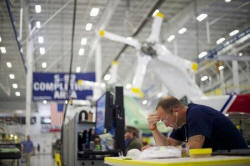|
The Pentagon's largest supplier said the net cost of the
Sikorsky deal was around $7.1 billion, taking into account tax
benefits resulting from the transaction. Lockheed also reported
higher earnings and revenue for the second quarter..
The deal cements Lockheed's dominance in weapons making and
opens key new foreign markets for the company, which dwarves its
nearest competitors, the defense business of Boeing Co <BA.N>
and Northrop Grumman Corp <NOC.N>.
"Sikorsky is a natural fit for Lockheed Martin and complements
our broad portfolio of world-class aerospace and defense
products and technologies," Lockheed Chief Executive Marillyn
Hewson said in a statement.
Lockheed, which makes F-35 fighter jets, naval ships and
high-end government satellites, said the purchase would have no
impact on its commitment to return cash to shareholders through
dividends and to reduce outstanding share count to below 300
million shares by the end of 2017.
It said it repurchased 4.9 million shares for $937 million in
the quarter, up from 0.8 million shares for $124 million in the
year earlier period.
Lockheed said it would align Sikorsky under its mission systems
and training business, which had already worked closely with
Sikorsky on several helicopter programs.
The company expects to close the transaction by late in the
fourth quarter of this year, or early in 2016, depending on
regulatory approvals.
It said it would complete a strategic review of its government
IT infrastructure services business and the technical services
business within its missiles and fire control segment by the end
of the year, units with about 17,000 employees.
The company will retain services businesses focused on defense
and intelligence customers.
UTC said proceeds from the sale of its copter unit would fund
more share buybacks to offset the earnings impact from the
departure of Sikorsky. Its board authorized a share buyback of
up to 75 million shares, which would be worth about $8.3 billion
based on Friday's closing price, the company said.
"Exiting the helicopter business will allow UTC to better focus
on providing high-technology systems and services to the
aerospace and building industries and to deliver improved and
sustained value to our customers and shareowners," UTC Chief
Executive Greg Hayes said in a statement.
(Additional reporting by Lewis Krauskopf in New York and
Sagarika Jaisinghani in Bangalore; Editing by Chizu Nomiyama and
Bernadette Baum)
[© 2015 Thomson Reuters. All rights
reserved.] Copyright 2015 Reuters. All rights reserved. This material may not be published,
broadcast, rewritten or redistributed.
 |
|





